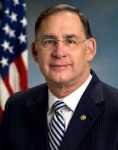- Supporting Americans with Disabilities and Their Families (3/6/25)
- Standing Up for Sportsmenís Access and Safety (2/20/25)
- Bringing Farm Country Voices to Washington (2/12/25)
- A New Front in the Fight Against Prostate Cancer (2/6/25)
- Taking Action to Reverse Immigration Failures and Protect Communities (1/30/25)
- Setting the Agenda for 2025 (1/22/25)
- Making progress for Arkansasís water infrastructure (1/16/25)
A Turning Point for the Right to Life
For nearly 50 years, Americans who have held to a belief that all human life is sacred and valuable have grieved the fact that the United States is among a handful of nations – including Communist China and North Korea – that allow for abortion on demand beyond the point when babies can feel pain.
Many on the other side of the political aisle often point to aspects of European culture or economic policy as worthy of aspiring toward, but refuse to confront the fact that even the overwhelming majority of these nations limit abortion at 15 weeks or earlier.
Which brings us to the case of Dobbs v. Jackson Women’s Health Organization. The Supreme Court heard oral arguments in this case on December 1, marking the first serious challenge in a generation to the abortion regime established under Roe v. Wade and clarified under Planned Parenthood v. Casey. The case concerns a Mississippi law that prohibits abortions after 15 weeks of gestation, when we know unborn children have limbs and fully-developed hearts, can taste, make facial expressions, yawn, hiccup, swallow and suck their thumbs.
Protecting these little ones from gruesome, painful and barbaric abortion procedures is the duty of any society that claims the mantles of morality and justice.
This is not a fringe position. In fact, three-quarters of Americans, including a majority who identify as pro-choice, want significant restrictions on abortion according to a Marist survey conducted earlier this year.
Americans may be familiar with the concept that the legal precent under Roe v. Wade grants women the right to terminate a pregnancy, but most are far less clear on the specifics around abortion or what it would mean if the nation’s highest court struck the ruling down.
Simply put, a decision by a majority of the Supreme Court to overturn Roe would not create a federal ban on abortion. What it would do is return to the states and the people the policy decisions related to this issue rather than nine justices in black robes based in Washington, D.C. Notably, the movement to defend the unborn also does not seek to punish vulnerable women susceptible to the false notion that abortion is their only or most sensible option.
With the Dobbs case, the day I and many pro-life advocates throughout Arkansas and across our country have been praying for has come. There is a very real possibility that our nearly five-decade nightmare, which has cost the lives of over 60 million children, could be on the verge of ending.
I joined supporters of life who rallied out in front of the Court before and during the oral arguments in this case. I met Arkansans who traveled to the nation’s capital to lend their voices to this essential cause. It was encouraging to be with these passionate individuals who care deeply about this issue.
Defending the right to life is one of the most important things we can do, because every life is precious and protecting the sanctity of life will demonstrate where the true values of our country are found.
This moment could be a turning point in our society’s moral and cultural evolution. The science tells us the unborn are human beings worthy of protection. Our consciences echo that truth.
We pray that our nation’s highest court helps put us back on the right track. We must draw this line in the sand and not shrink back. The stakes are too high. We will continue to lift our voices in defense of life.
Posting a comment requires free registration:
- If you already have an account, follow this link to login
- Otherwise, follow this link to register

